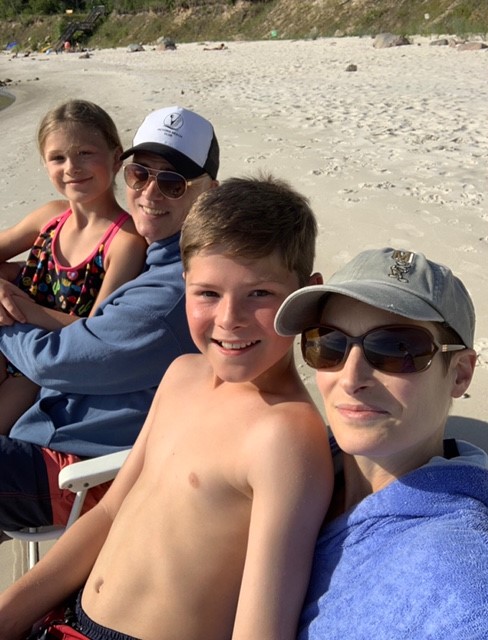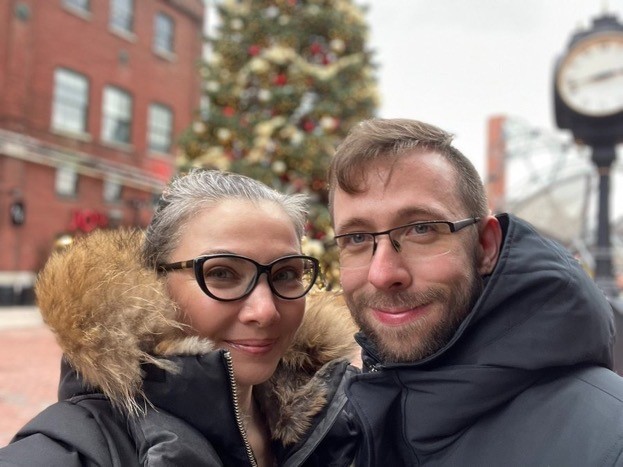Catherine Wreford Ledlow is looking forward to Christmas.

Last year, due to the COVID-19 pandemic, her family kept things quiet — fewer gifts, no cookie bake, no church, and not even her sister came over for dinner.
“I think this year it’s going to be a little bit more fun and a little bit more joyous for everybody,” the mother of two from Winnipeg said. She plans to see her parents, sister and a couple of friends.
This matters to her — she has terminal brain cancer.

“I know that with me having brain cancer, it’s how many years do I have?” she said. “But at the same time, I can enjoy this moment at this time, and I don’t need to look forward to anything.
“I can spend this with my family and my close friends. I know that that’s enough.”

Dario Wuensch, who lives in Toronto, had planned to visit family in Germany this year, but he cancelled his trip as case numbers started to increase in his home country.
“Numbers are spiking like crazy in Germany,” he said. “I would say it’s just the reasonable decision to delay seeing my family. I haven’t seen them since the beginning of the pandemic, so obviously that’s not great.
“But at the same time, it was an easy decision based on the numbers that they have right now.”
Christmas isn’t cancelled entirely this year, though, public health experts say. While no gathering is risk-free, taking some precautions can help to make your celebration safer.
Keep it small
Public health experts say gatherings can still take place, but they shouldn’t be large.
“I would keep things small at this point because we do need to limit our contacts,” said Dr. Susy Hota, medical director of infection prevention and control for Toronto’s University Health Network.
There’s no magic number of people that makes a gathering safe, she said. Rather, it should be tailored depending on people’s comfort level and whether they are at risk of severe complications from COVID-19, such as being older or immunocompromised. You should also check gathering limits in your area.
As an example, three southwestern Ontario health units jointly recommended Thursday that everyone should limit indoor social gatherings in private dwellings to no more than 10 people, and all attendees aged 12 and older should be vaccinated.
At a press conference Friday, Dr. Howard Njoo, the deputy chief public health officer of Canada, said that he felt 25 was a bit too many and he personally would stick with a more intimate gathering of around 10.

Get vaccinated
“Vaccines have given us substantial protection from infection and severe outcomes to date, dampening the impact of the Delta-driven wave this fall,” said Dr. Theresa Tam, chief public health officer of Canada during a press conference Friday.
While it’s possible that the new Omicron variant might evade some vaccines, she believes they should still provide good protection.

Get weekly health news
“We’re safer when everyone who is eligible is fully vaccinated and if all who are eligible also get a COVID-19 booster dose,” she said.
You might also want to know the vaccination status of those you plan to see, said Nazeem Muhajarine, an epidemiologist and professor at the University of Saskatchewan.
“Vaccination status should really be a part of our conversation,” he said.
He recommends starting the conversation by disclosing your own status, and then asking about other people’s.

“I’m fully vaccinated. I will gather with others who are fully vaccinated,” he said. If he doesn’t know someone’s vaccination status, or they won’t say, he will put on a mask.
And, everyone says, if you’re feeling at all ill, you should stay home and not see others.
Improve ventilation
You might want to open a window at your indoor gathering, Hota said, to lessen the chances of airborne transmission of the virus, or hold the event outside instead.
“Consider a mixture of outdoor and indoor gatherings with people that you care about, especially if you have unvaccinated individuals or keep windows open and crank the heat for the while that you’re all together,” she suggested.

The Public Health Agency of Canada has some tips on its website for improving ventilation in indoor spaces.
You can also always wear a mask, Hota added.
“If you’re feeling very uncomfortable and especially if you’re vulnerable, if you have immune-compromising conditions and you’re at risk for severe COVID.”
Take rapid tests if you can
If they’re available in your jurisdiction, rapid tests can provide an added layer of assurance going into holiday gatherings, Muhajarine said.
“If I am expecting someone to come and visit me for the holidays, I will ask them to take a rapid antigen test,” he said. “And I myself will take a test in 24 to 48 hours after they have arrived.”
While rapid tests aren’t 100 per cent reliable, he said, they can provide an added layer of protection and reassurance if you’re choosing to see people over the holiday season.
Reconsider international travel plans
Canada’s health minister and top doctors warned about international travel as Omicron cases creep higher.
“We’re not currently advising Canadians not to travel,” said federal health minister Jean-Yves Duclos during a press conference Friday. However, he spent a lot of time outlining why it might be a bad idea.
Because of the outbreak of the Omicron variant, conditions are rapidly changing in other countries, he said.
“If they think of travelling, that should be a serious alarm bell, a serious concern for them,” he said.
“Canadians who are thinking of travelling abroad need to be warned that the situation abroad is both risky and unstable. They should also know that returning to Canada will likely involve delays and hassle,” he said.
Canada’s deputy chief public health officer, Dr. Howard Njoo, said Canadians who are more vulnerable to the virus should be particularly cautious.
“If you are maybe in a certain age group that has underlying health issues, other conditions that put you at higher risk of severe consequences, I think you should really think twice even if you’re fully vaccinated,” Njoo said during a press conference Friday.

“The pandemic’s raging in many countries around the world that haven’t been so fortunate as ourselves in terms of their vaccine coverage and use of public health measures. So it really, I think, behooves you to take a careful look: what is the vaccine coverage, what is the epidemiology if you are still planning to go overseas.”
Reasons for optimism
While it may be disheartening to hear about a new emerging variant, there is reason for Canadians to be optimistic as the holidays approach.
Even though the pandemic isn’t over, this year is still better than last, Tam said.
“This time last year, we were experiencing double the number of daily cases, more than double the number of people with COVID-19 being treated in hospitals and in intensive care daily. Most importantly, daily reported deaths are 82 per cent lower than this time last year,” she said.
“As we look to the holidays and weeks ahead, caution is still warranted. But as you consider the risk for you and yours, we can be thankful we’re better protected with vaccines and have more choices to allow us to come together more safely.”
— with files from Global News’ Jamie Mauracher and the Canadian Press



Comments